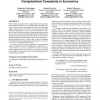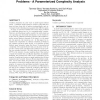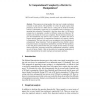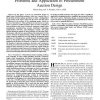1662 search results - page 5 / 333 » The Computational Complexity of Agent Design Problems |
SIGECOM
2011
ACM
12 years 10 months ago
2011
ACM
Recent results in complexity theory suggest that various economic theories require agents to solve computationally intractable problems. However, such results assume the agents ar...
ATAL
2009
Springer
14 years 2 months ago
2009
Springer
Coalition formation is a key topic in multi–agent systems (mas). Coalitions enable agents to achieve goals that they may not have been able to achieve independently, and encoura...
CLIMA
2010
13 years 7 months ago
2010
When agents are acting together, they may need a simple mechanism to decide on joint actions. One possibility is to have the agents express their preferences in the form of a ballo...
TSMC
2002
13 years 7 months ago
2002
Alerting systems and related decision-making automation are widely used to enhance the safety and capability of controlled processes across many applications. Traditional alerting ...
TASE
2008
IEEE
13 years 7 months ago
2008
IEEE
In this paper, we focus on mechanism design for single leader Stackelberg problems, which are a special case of hierarchical decision making problems in which a distinguished agent...




